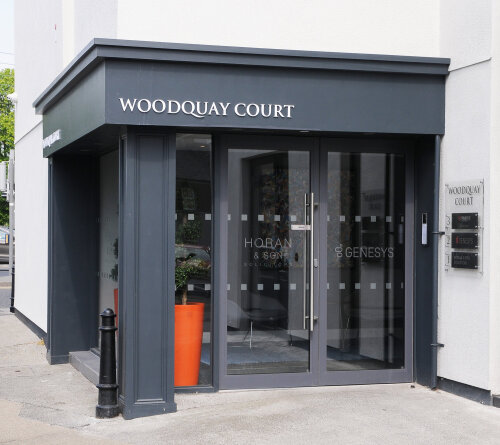Best Franchising Lawyers in Galway
Share your needs with us, get contacted by law firms.
Free. Takes 2 min.
List of the best lawyers in Galway, Ireland
About Franchising Law in Galway, Ireland
Franchising in Galway, Ireland is a dynamic way to expand business opportunities, involving a franchisor allowing a franchisee to operate using their systems, brand, and support. The franchising model offers an enticing gateway for entrepreneurs due to its established brand recognition and structured operation guidance. However, the absence of specific franchising legislation in Ireland means it operates under various areas of law, including contract, intellectual property, and competition law. This makes understanding local business culture in Galway and Irish legal frameworks essential for successfully navigating franchising agreements.
Why You May Need a Lawyer
Engaging a lawyer skilled in franchising law can provide invaluable assistance in several scenarios:
- Drafting or reviewing franchise agreements to ensure fairness and full legal compliance.
- Handling any disputes that arise between franchisors and franchisees.
- Providing counsel on the protection of intellectual property rights.
- Navigating termination or renewal of franchise contracts to avoid penalties.
- Ensuring compliance with Ireland’s tax regulations and employment laws as they apply to franchising.
Local Laws Overview
While specific franchising laws are absent in Ireland, franchising operations must still adhere to several legal frameworks:
- Contract Law: Franchise agreements are primarily governed by contract law principles. These contracts must be carefully crafted to explicitly outline the roles and responsibilities of both parties.
- Competition Law: The Competition and Consumer Protection Commission (CCPC) ensures that the trade practices adhered to in franchising comply with fairness and competitive standards.
- Intellectual Property Law: Protects franchisors' branding and proprietary systems, crucial for maintaining brand integrity across different locales.
- Employment Law: Employment relationships within a franchise must adhere strictly to Ireland’s employment regulations, impacting hiring, employee rights, and workplace standards.
Frequently Asked Questions
What is the role of a franchise agreement?
A franchise agreement is a legal document that defines the relationship between a franchisor and franchisee. It details the rights and responsibilities of both parties, the terms of the franchise, fees, and operational guidelines.
Are there specific franchising laws in Ireland?
No particular laws govern franchising specifically in Ireland, but activities must adhere to general contract law, competition, and intellectual property laws.
What should I consider before becoming a franchisee?
Carefully evaluate the franchisor’s business model, market demand, initial and ongoing costs, contractual obligations, and the level of support they offer.
How can I resolve a dispute with my franchisor?
Dispute resolution typically involves negotiation, mediation, or arbitration as outlined in the franchise agreement. Legal counsel can assist in these proceedings to protect your interests.
Can a franchise agreement be terminated early?
Termination depends on the terms agreed upon in the contract. Violations of these terms may justify early termination, but it often requires legal examination to avoid penalties.
What are my obligations regarding branding as a franchisee?
Franchisees must adhere strictly to use franchisor’s branding as per the guidelines outlined in the franchise agreement to maintain brand integrity and uniformity.
Do I need approval to sell my franchise?
Most franchise agreements include clauses requiring franchisors’ approval for the transfer or sale of franchises. Consulting a lawyer can facilitate the legalities of such transactions.
What financial obligations are typically involved in franchising?
Common financial obligations include upfront franchise fees, ongoing royalties, marketing contributions, and operational expenses necessary for running the franchise.
How is data protection handled in franchising?
Franchisees must comply with Ireland’s data protection laws, especially regarding customer data. Adequate data handling and protection systems must be established and maintained.
What support can I expect from the franchisor?
Typical support includes training, marketing strategies, operational guidance, and ongoing assistance as per the franchise agreement, aimed to foster the franchisee’s success.
Additional Resources
For individuals seeking more information about franchising in Galway, Ireland, consult resources such as:
- The Irish Franchise Association provides insights, networking opportunities, and support.
- The Competition and Consumer Protection Commission (CCPC) oversees fair business practices.
- Professional associations and local business groups in Galway can offer local insights and networking opportunities.
Next Steps
If you require legal assistance with franchising in Galway, consider the following steps:
- Gather all relevant documents related to your franchise, including contracts and correspondence.
- Consult with a solicitor specializing in franchising to understand your legal position and responsibilities.
- Determine your objectives, whether it's entering a franchise agreement, resolving disputes, or understanding compliance obligations.
- Engage in a preliminary consultation to discuss your situation and explore legal strategies tailored to your needs.
Lawzana helps you find the best lawyers and law firms in Galway through a curated and pre-screened list of qualified legal professionals. Our platform offers rankings and detailed profiles of attorneys and law firms, allowing you to compare based on practice areas, including Franchising, experience, and client feedback.
Each profile includes a description of the firm's areas of practice, client reviews, team members and partners, year of establishment, spoken languages, office locations, contact information, social media presence, and any published articles or resources. Most firms on our platform speak English and are experienced in both local and international legal matters.
Get a quote from top-rated law firms in Galway, Ireland — quickly, securely, and without unnecessary hassle.
Disclaimer:
The information provided on this page is for general informational purposes only and does not constitute legal advice. While we strive to ensure the accuracy and relevance of the content, legal information may change over time, and interpretations of the law can vary. You should always consult with a qualified legal professional for advice specific to your situation.
We disclaim all liability for actions taken or not taken based on the content of this page. If you believe any information is incorrect or outdated, please contact us, and we will review and update it where appropriate.














